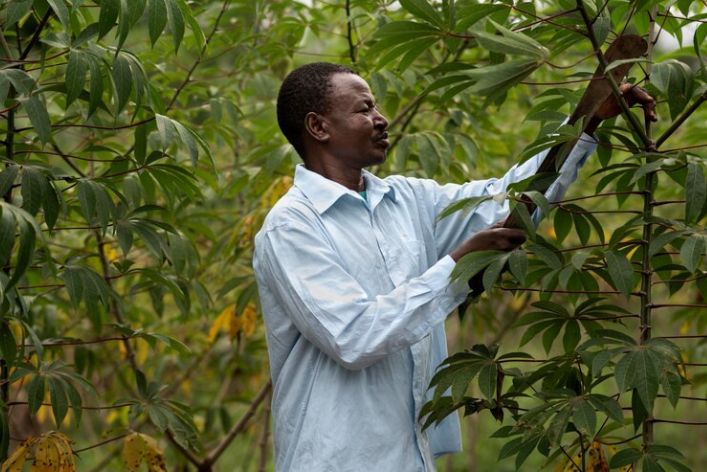Introduction
Agroforestry is a land-use management system that involves growing trees, crops, and/or livestock on the same piece of land. In Nigeria, agroforestry has become increasingly important due to its numerous benefits. It helps to restore degraded lands, promote biodiversity, and provide farmers with additional sources of income.
However, despite the potential benefits, the adoption of agroforestry practices in Nigeria has been slow. This is partly due to a lack of awareness among farmers about its benefits and the lack of available job opportunities. This blog post aims to provide a comprehensive insight into agroforestry jobs in Nigeria.
The purpose of this post is to encourage more people to consider careers in agroforestry. We will explore the various job opportunities available in the sector, which include tree planting, tree management, and animal husbandry.
We will also discuss the skills required for these jobs, the potential income, and the challenges faced by those working in agroforestry.
Generally, agroforestry is a vital tool in promoting sustainable land use in Nigeria. Providing farmers with additional sources of income and restoring degraded lands, it can play a significant role in poverty reduction and climate change mitigation.
This blog post aims to raise awareness about the job opportunities available in agroforestry and to encourage more people to consider a career in this important sector.
Read: Venturing into Sericulture: Silk Farming in Nigeria
Background on Agroforestry Jobs in Nigeria
Agroforestry integrates trees, crops, and animals, offering sustainable farming and resource conservation in Nigeria.
The country’s abundant arable land and favorable weather conditions have fueled the growth of agroforestry jobs.
Job opportunities include tree planting, crop management, animal rearing, food processing, and marketing.
Key players are government agencies, private sector companies, and NGOs, all prioritizing agriculture and employment.
The Ministry of Agriculture and Rural Development regulates agricultural activities.
Private companies invest in large-scale farming, creating jobs and engaging in diverse agricultural practices.
NGOs focus on improving rural livelihoods through training, technology, and market access.
Agroforestry jobs provide economic potential, direct/indirect employment, food security, and resource conservation.
With appropriate policies, Nigeria’s agroforestry industry can drive economic growth and development.
Collaboration between the government, private sector, and NGOs is essential to harness the industry’s potential.
This will enhance employment, boost the economy, and improve the lives of Nigerians.
Read: Career Spotlight: Livestock Farming Jobs in Nigeria
Types of Agroforestry Jobs in Nigeria
Agroforestry is an important sector that plays a significant role in the economy of Nigeria. As the name suggests, agroforestry combines both agriculture and forestry practices to achieve sustainable land-use management.
However, the true potential of agroforestry cannot be fully realized without the expertise of skilled professionals. In this blog, we will explore the different types of agroforestry jobs in Nigeria.
Tree planting and maintenance
Tree planting and maintenance are considered to be the most common types of agroforestry jobs in Nigeria.
This involves planting various types of trees, including fruit trees, shade trees, and timber trees, and ensuring their proper care throughout their life cycle.
This job involves knowledge of tree physiology, breeding, and propagation, as well as the ability to identify and treat diseases, pests, and other environmental threats.
Agroforestry research and development
Agroforestry research and development is a critical aspect of the agroforestry sector. This job involves conducting research on different species of trees, their growing conditions, and their impact on the environment.
The research is then used to develop new agroforestry techniques and technologies that promote sustainable land-use management.
Professionals in this field should have a strong background in research methodology, data analysis, and project management.
Sustainable forest management
Sustainable forest management involves managing forest resources, ensuring that they are used in a way that supports social, environmental, and economic sustainability.
This job requires a deep understanding of forest ecology, environmental policy, and forest management techniques.
Professionals in this field are responsible for developing sustainable forest management plans, conducting site inspections and audits, and monitoring forest conditions to ensure compliance with local and national regulations.
Forest restoration and conservation
Forest restoration and conservation involve restoring and conserving degraded forest lands and protecting existing forests. This involves skill sets such as landscape design, soil and water conservation, and forest management.
Professionals in this field work to develop restoration plans that promote long-term sustainability and biodiversity, and they also work to engage local communities and stakeholders in the restoration process.
All in all, agroforestry jobs in Nigeria are numerous and vary in scope and expertise. In order to sustainably manage Nigeria’s natural resources and promote economic growth, there is a need for skilled professionals in the field.
From tree planting and maintenance to forest restoration and conservation, each agroforestry job requires specific skill sets and knowledge.
Therefore, as Nigeria continues to build its agroforestry sector, it is essential to prioritize the development of a skilled workforce that can support this vital industry.
Read: Nigeria’s Agricultural Extension Services: Career Scope
Skills and Qualifications Required for Agroforestry Jobs in Nigeria
Agroforestry jobs in Nigeria have gained popularity in recent years due to the country’s emphasis on sustainable agricultural practices.
Apart from having a passion for agriculture and the environment, the following skills and qualifications are required to succeed in agroforestry jobs in Nigeria:
Educational Requirements
- A Bachelor’s degree in forestry, agriculture, environmental science, or any related field
- A Master’s degree in agroforestry or a related discipline is an added advantage
- Knowledge of basic computer applications such as Microsoft Office Suite and GIS
- Fluency in the English language, as it’s the country’s official language
Technical Skills
- Knowledge of modern farming techniques
- Ability to assess and analyze land suitability for agroforestry
- Understanding of soil management and conservation techniques
- Knowledge of land-use planning and crop management practices
- Skills in sustainable land management, tree planting, and maintenance
Soft Skills
- Excellent interpersonal and communication skills
- Ability to work independently and as part of a team
- Good problem-solving and decision-making abilities
- Strong organizational and time management skills
- Flexibility and adaptability to changing situations
Work Experience
Although work experience is not always required, having some experience in agroforestry or related fields is an added advantage. Some of the areas where one can get experience include:
- Participating in volunteer programs related to agroforestry initiatives
- Working as a research assistant in a forestry or agricultural research institute
- Interning with a nonprofit organization that promotes sustainable agriculture
- Working with a private sector company involved in agroforestry or agricultural initiatives
To succeed in agroforestry jobs in Nigeria, you need to have the right skills and qualifications. Educational requirements, technical skills, soft skills, and work experience are some of the qualifications that can land you an agroforestry job in Nigeria.
As the country continues to focus on sustainable agricultural practices, agroforestry jobs will continue to grow, and individuals with the right qualifications and experience will be in high demand.

Challenges Facing Agroforestry Jobs in Nigeria
Despite the immense potentials that exist in Agroforestry, there are numerous challenges that face the sector in Nigeria. Below are some of the most pressing challenges that need to be addressed:
Inadequate Funding
The inadequate funding of Agroforestry programs is one of the significant challenges that is facing the sector in Nigeria.
Most farmers in the country lack the necessary capital to invest in Agroforestry, which makes it difficult for them to scale the business.
Limited Access to Technology
Due to insufficient funding, Nigerian farmers have limited access to technology, which makes it challenging for them to leverage technology to improve their yield and productivity even though there is the need for advanced technologies to drive mechanization, increase the efficiency of harvesting and processing farm products and encourage storage practices to increase shelf lives of the product
Inadequate Government Policies
Another challenge facing Agroforestry in Nigeria is the absence of adequate government policies to support and regulate the sector.
The lack of guidelines makes the operation of the business challenging as farmers have to grapple with market instability, inadequate credit facilities, and a lack of input and equipment extension services.
Climate Change Effects
The impact of climate change is being felt in Nigeria, and it is affecting the Agroforestry sector. Farmers are increasingly experiencing extreme weather conditions such as severe droughts and floods that destroy crops, decrease crop yields, and increase the cost of production.
Climate change has also led to soil erosion which keeps degrading the quality of the soil and creates low productivity of farm output.
The Agroforestry sector is critical for Nigeria’s economic development; the industry creates employment and income, reduces greenhouse gas emissions, and helps clean the air, water, and soil.
However, without addressing the challenges in the sector, farmers will continue to struggle to grow Agroforestry businesses.
Therefore there is a need for more investment in Agroforestry to increase the value of farm output and develop channels of supplying farm produce to the market.
The government also needs to formulate supportive policies that allow farmers in the sector to get support in financing, education, and upskilling of farmers in digital proficient farming techniques that can hasten the development of the sector, and also in finding effective means of tackling the environmental challenges affecting Agroforestry activities in Nigeria.
Opportunities in Agroforestry Jobs in Nigeria
Agroforestry is gradually gaining popularity in Nigeria and for good reasons. Agroforestry combines the practices of agriculture and forestry to create a sustainable land-use system that benefits the environment and helps to alleviate poverty by creating jobs. Here are some opportunities in Agroforestry jobs in Nigeria:
Government incentives
- The Nigerian government has made it a priority to diversify the economy and promote sustainable practices in agriculture.
- As a result, there are several government incentives available to agroforestry practitioners, including grants and tax exemptions.
- These incentives help to make agroforestry a more viable and attractive option for investors and practitioners alike.
High demand for agroforestry products
- Agricultural products and raw materials are major components of Nigeria’s economy.
- In recent years, there has been an increasing demand for sustainably produced agroforestry products such as fruits, nuts, timber, and non-timber forest products (NTFPs) such as medicinal plants.
- This high demand presents a significant opportunity for agroforestry practitioners to leverage and expand their businesses.
Job creation and poverty reduction
- Agroforestry has the potential to create jobs and reduce poverty in rural areas, where unemployment and poverty rates are high.
- By adopting agroforestry practices, farmers can diversify their income streams, increase productivity, and generate more profit.
- This translates to more employment opportunities and better livelihoods for people living in rural areas.
Increased food security
- Practicing agroforestry can help to increase food security in Nigeria by diversifying crop production and reducing the risk of crop failure.
- Agroforestry practices such as intercropping and alley cropping can improve soil fertility and increase crop yield.
- The use of trees in agroforestry can also provide shade and windbreaks, which are essential to protecting crops from harsh weather conditions.
Essentially, Agroforestry presents a significant opportunity for job creation, poverty reduction, and better livelihoods for people living in rural areas in Nigeria.
The increasing demand for sustainably produced agroforestry products, and the support and incentives provided by the government, make agroforestry a viable and attractive option for investors and practitioners.
By adopting agroforestry practices, farmers can increase productivity, generate more profit, and help to ensure food security in Nigeria.
Read: Aquaculture Careers: Profiting from Nigeria’s Waters
Conclusion
Agroforestry jobs in Nigeria play a crucial role in the country’s economic development and environmental sustainability. With a growing demand for food and wood products, agroforestry has the potential to provide employment opportunities for millions of Nigerians.
However, the agroforestry industry in Nigeria requires more investment to realize its full potential. The government, private sector, and international organizations can support the industry by providing funding, training, and technical assistance.
The future of agroforestry jobs in Nigeria looks promising as the country continues to prioritize agriculture and environmental conservation.
With proper investments and policies, agroforestry can create jobs, reduce poverty, and combat climate change.
On a final note, agroforestry jobs are important for Nigeria’s economic and environmental sustainability. The industry requires more investment, and stakeholders must take action to support it.
The future of agroforestry jobs in Nigeria is bright, and the country can reap its benefits by investing in the industry.




